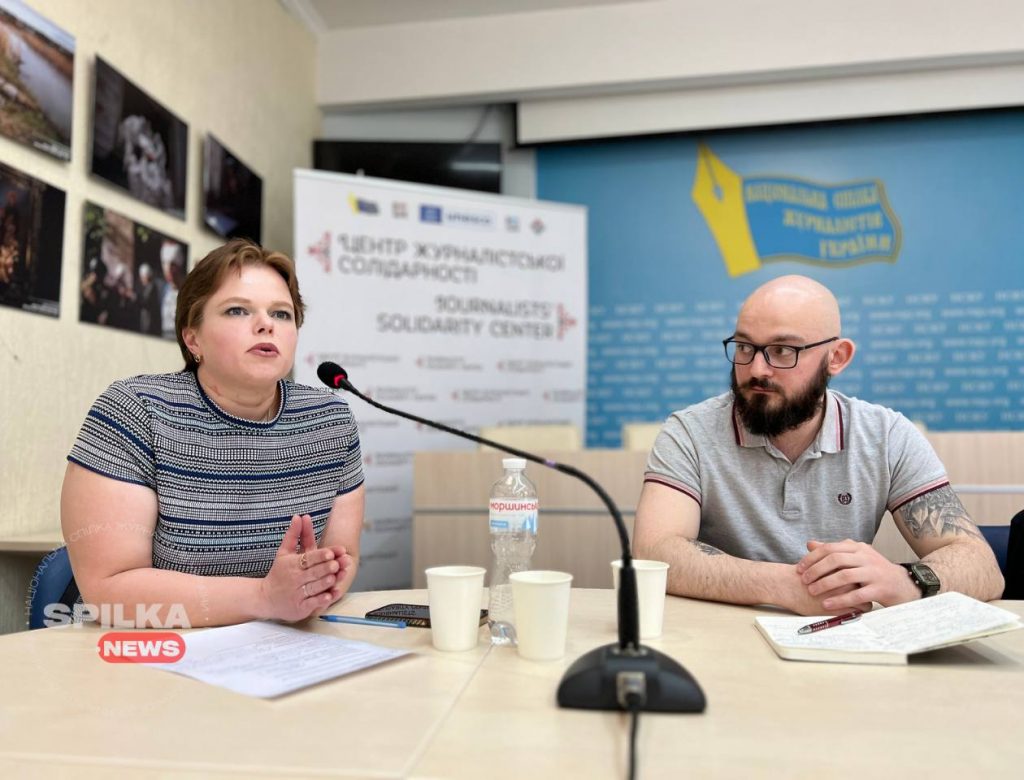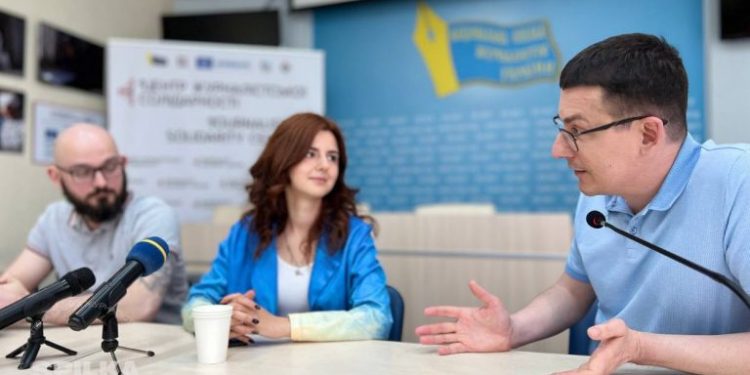War correspondents Oleksandra Yefymenko and Ruslan Khalapov shared their advice based on their own experience of how to work in a zone of hostilities. They held a master class organized by the Network of Journalists’ Solidarity Centers (JSC) of the National Union of Journalists of Ukraine (NUJU).
Opening the event, Sergiy Tomilenko, the President of the NUJU, noted that today journalists perform an essential mission of giving the victims of war crimes a chance for justice and making their story heard. He noted that during the full-scale war, Ukrainian war correspondents gained invaluable experience they could share.
Oleksandra and Ruslan talked about how to prepare for a trip to hot spots, what to have in a first-aid kit, how to communicate with the newsroom staff while working in a war zone or under occupation, and what mistakes to avoid.
Their practical advice included the following:
- Before leaving, plan the route in detail to understand what settlements can be reached on their own and what cannot, and have prematurely downloaded offline maps (no paper maps are recommended).
- Conduct car diagnostics. It should have a first-aid kit, fire extinguisher, warning signs, spare tire, pump, water supply, and fuel.
- Take old laptops and store data on hard drives or in the cloud.
- Regularly undergo training in medical assistance. A properly applied tourniquet saves lives.
- A colleague who a journalist plans to work with in a combat zone should know where your first aid kit is and its contents. Take an extra first aid kit with your medications.
- Park the car under trees so that the leaves cover it.
- Stock up on food, canned goods, dried fruit, energy bars, and oatmeal.
- Try to delete working correspondence.
- Give the editor the contacts of your close relatives, a lawyer, and insurance companies in the occupied territory and Kyiv.
- Take the documents: editorial certificate, press card, Ministry of Defense accreditation, passport – print and laminate, or save screenshots on your phone.

As earlier reported, the Journalists’ Solidarity Centers is an initiative of the NUJU implemented with the support of the International and European Federations of Journalists and UNESCO. The initiative is designated to help media representatives working in Ukraine during the war. The Centers operate in Kyiv, Lviv, Ivano-Frankivsk, Chernivtsi, Zaporizhzhia, and Dnipro and provide journalists with organizational, technical, legal, psychological, and other types of assistance.
UNESCO is the United Nations Educational, Scientific, and Cultural Organization. It contributes to peace and security by promoting international cooperation in education, sciences, culture, communication, and information. UNESCO promotes knowledge sharing and the free flow of ideas to accelerate mutual understanding. It is the coordinator of the UN Action Plan on the Safety of Journalists and the Issue of Impunity, which aims to create a free and safe environment for journalists and media workers, thus strengthening peace, democracy, and sustainable development worldwide. UNESCO is working closely with its partner organizations in Ukraine to provide support to journalists on the ground.
The designations employed and the presentation of material throughout this digest do not imply the expression of any opinion whatsoever on the part of UNESCO concerning the legal status of any country, territory, city, or area or its authorities or concerning the delimitation of its frontiers or boundaries.
The authors are responsible for the choice and the presentation of the facts contained in this digest and for the opinions expressed therein, which are not necessarily those of UNESCO and do not commit to the organization.
NUJU Information Service

 THE NATIONAL UNION OF
JOURNALISTS OF UKRAINE
THE NATIONAL UNION OF
JOURNALISTS OF UKRAINE
















Discussion about this post